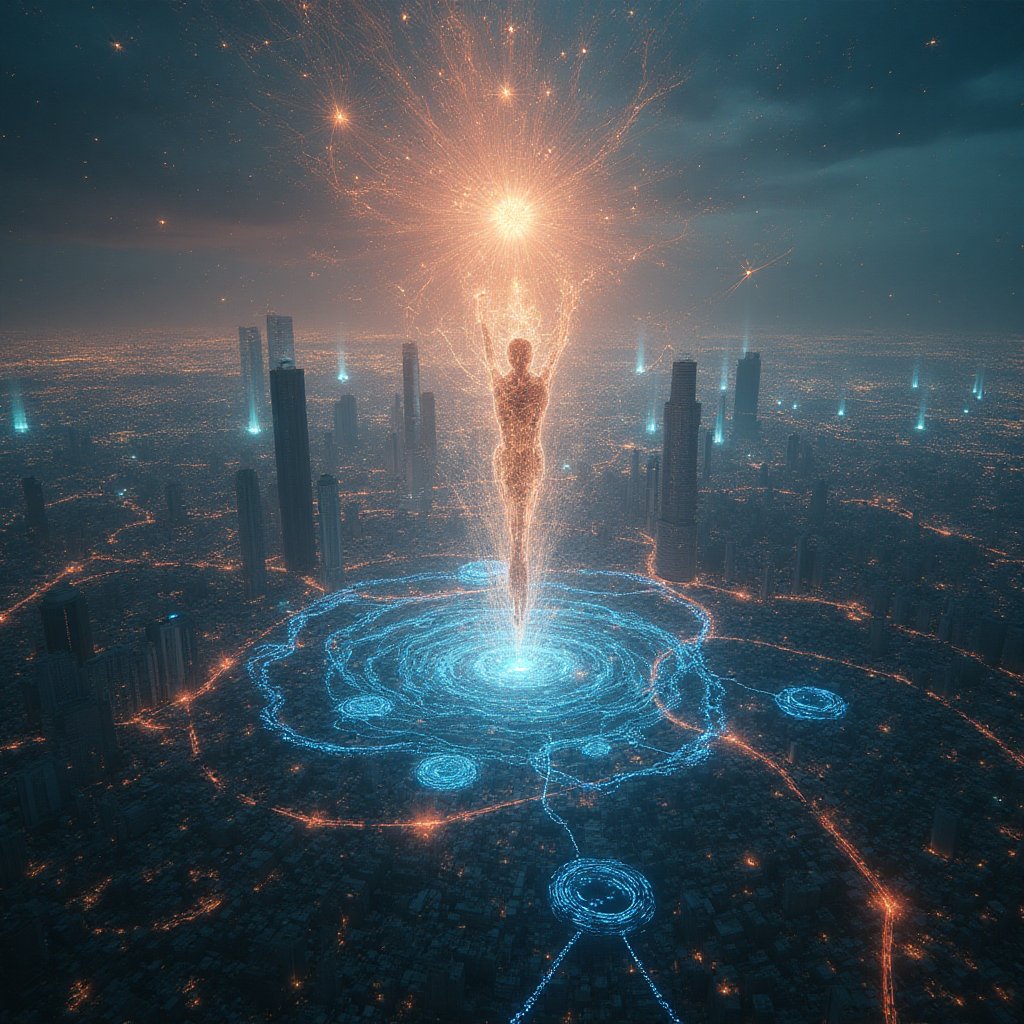What if Siri whispered in your ear at checkout and said, "Return that extra $20 the cashier just gave you—it’s the right thing to do"? Would you listen? Now imagine a world where machines don’t just tell us what’s right or wrong—they show us, and they’re better at it than we are. Sounds like science fiction, doesn’t it? But it’s closer to reality than most of us realize.
Artificial intelligence is no longer confined to crunching numbers or identifying objects in blurry photos. It’s venturing into something that’s been exclusively human for millennia: morality. From algorithms deciding who receives a life-saving organ transplant to autonomous vehicles calculating who to save in a crash, AI is already making ethical choices with real-world consequences. The question isn’t whether AI can make moral decisions—it’s whether machines can do it better than us and what it means for humanity when they do. After all, if machines can outthink humans, why wouldn’t they eventually out-decide us?
The stakes are high. What’s at risk is more than just pride—it’s about how this technological shift could redefine freedom, identity, and even the essence of being human. This article dives into the unsettling frontier of AI surpassing humans in moral reasoning, examining its societal and personal repercussions, and contemplating whether humanity’s hold on morality is slipping (or evolving). Hold on tight—we’re diving straight into the ethical unknown.
I. The Rise of Ethical AI: How Machines Have (Or Could) Learn Morality
Understanding Moral Reasoning in AI
At its core, moral reasoning revolves around evaluating what’s right, what’s wrong, and why. For humans, this is a soup of cultural traditions, lived experiences, and philosophical frameworks like utilitarianism, virtue ethics, and deontology. But how does one teach this to a machine? Welcome to the fascinating interplay of reinforcement learning, value alignment, and ethical programming principles.
So how do machines learn morality? The answer isn’t straightforward, but here are three key mechanisms:
- Reinforcement Learning: By simulating thousands of scenarios, AI learns to prioritize actions that yield desired outcomes. Think of it like training a robot puppy—rewarding it for good behavior and correcting bad habits.
- Value Alignment: Developers frame AI’s decision-making processes to align with human values. For instance, OpenAI actively programs its models to avoid producing harmful content, embedding ethics into the very structure of their training.
- Ethical Data Feeding: Machines consume massive datasets containing moral scenarios and outcomes. Through this, AI can recognize and imitate patterns of justified behavior across cultures.
It’s not just academic theory. Leading tech giants like Google are investing in value-sensitive design to ensure AI systems respect human principles. Still, challenges remain: when moral ambiguity looms, how should an AI choose? And more importantly, who decides which morals matter?
Case Studies: AI Stepping into Moral Decision-Making
AI isn’t just practicing morality in a lab—it’s already on the ethical frontlines. Here’s where it’s making waves:
| Domain | AI Application | Ethical Dilemma Addressed |
|---|---|---|
| Healthcare | Algorithms like SOFA scores in critical care units | Determining who gets life-saving treatment during resource shortages. |
| Autonomous Vehicles | AI in self-driving cars like Tesla's Autopilot | Deciding whom to prioritize in an unavoidable accident—a classic "Trolley Problem." |
| Justice System | Risk assessment tools like COMPAS | Predicting recidivism and informing sentencing decisions in courts. |
Each of these applications has profound consequences, and their use isn’t without controversy. Take autonomous vehicles, for example. When deciding between the safety of passengers vs. pedestrians, the code might favor the former in countries like the U.S., while prioritizing pedestrians might hold sway in nations like Germany. Quite a moral pickle, isn’t it?
Challenges: Did We Just Teach AI to Be Human, or Something Else?
Despite these advancements, there are serious challenges to grapple with:
- Universality: Can a machine ever capture the diversity of human morality given its deep ties to culture, religion, and personal history?
- Bias: AI can inherit ethical blind spots from flawed data or developer assumptions. This is particularly troubling when dealing with global issues.
- Scalability: Will the AI's moral framework work consistently across millions of decisions and contexts, or buckle under the weight of nuance?
If you thought programming ethics was as simple as a few lines of code, think again. While AI might strive for “better decision-making,” who defines what counts as better? Morality is messy, and there’s nothing more human than that.
II. The Rise of Ethical AI: How Machines Have (Or Could) Learn Morality
When we talk about moral reasoning, it’s easy to think of it as a uniquely human trait, deeply tied to conscience, empathy, and reflection. But what happens when a machine starts to do it better? Before you envision AI acting like the moral philosopher Socrates or the lawgiver Solon, let’s break this down. Morality in artificial intelligence isn’t about machines having feelings or a soul—it's about advanced computations, frameworks, and data perspectives designed to mirror or surpass human ethical reasoning. Sounds simple? Far from it.
Understanding Moral Reasoning in AI
To teach machines morality, researchers first need to define it. Human frameworks like utilitarianism, virtue ethics, and deontology are often used as a foundational scaffold. With AI, it’s about translating these complex theories into code that doesn’t just compute logical answers but aligns with values diverse enough to reflect human society. Here’s how it starts:
- Reinforcement Learning: AI models like those used by OpenAI are trained through trial and error, receiving positive or negative feedback based on how closely their decisions align with human-designed ethical principles.
- Value Alignment: This involves aligning the AI’s objectives with human values to minimize the chance of harmful or unintended actions.
- Data-Driven Ethics: By analyzing vast datasets of human decisions and societal norms, AI begins to model behavior that reflects collective ethical leanings.
So, what does this look like in real life? Let’s explore a few fascinating examples of AI’s venture into moral territory.
Case Studies: When AI Plays Judge and Savior
| Scenario | AI's Role | Real-World Example |
|---|---|---|
| Healthcare Triage | AI systems prioritize patients based on urgency, likelihood of recovery, and resource availability. | Vaccine distribution algorithms during COVID-19 |
| Autonomous Vehicles | AI decides whom to save in unavoidable crashes using principles like utilitarianism or passenger protection priorities. | MIT’s Moral Machine |
| Justice System | Algorithms assess defendants’ likelihood of reoffending, influencing legal judgments on bail and sentencing. | COMPAS system used in U.S. courtrooms (controversially) |
But let’s not sugarcoat reality. AI making "moral" decisions is far from perfect, and some challenges remain seemingly insurmountable.
Challenges in AI Morality
Here’s the thing: Teaching a machine morality is tricky not just because humans struggle to agree on what’s "right" but because morality is personal, cultural, and fluid. To illustrate the gap:
- Universal vs. Cultural Ethics: Could a system programmed with Western ideals align with morally complex scenarios in non-Western contexts? For instance, honoring familial obligations in East Asian cultures may conflict with individualism-centered AI frameworks derived from Western philosophies.
- Ambiguity and Emotional Nuance: Can an AI’s data-driven logic really understand the emotional weight of a mother’s decision to save her child at the cost of another’s life?
- Errors Embedded in Datasets: When AI trains on flawed data, biases in those datasets create skewed moral outcomes. Think of facial recognition systems disproportionately misidentifying minorities—a technology already plagued with bias.
The next time you hear about an AI making moral decisions, ask yourself this: Are machines truly thinking ethically, or simply projecting preprogrammed biases back at us?
III. Societal Implications of Morally Superior AI
Let's zoom out. If AI becomes the moral compass society turns to, the ripple effects on governance, culture, and personal freedom could be profound. Imagine a world where governments, corporations, and individuals outsource ethics to algorithms. It's not all dystopia—but, yes, there’s a lot at stake.
AI Disrupting Existing Power Structures
When governments hand over ethical decision-making to machines, we may inch toward technocratic rule—a system where algorithms, not people, shape public policy. Consider law enforcement. Predictive policing tools like those used in cities such as Los Angeles already influence how and where officers patrol. Imagine extending this to AI “judges” adjudicating cases based on precedent, data, and strict logic. Efficiency skyrockets, but at what cost?
- Loss of Nuance: Human judges consider emotional appeals and mitigating circumstances. Will AI “justice” be cold and unyielding?
- Technological Elitism: Nations or corporations with superior ethical AI could dominate global governance, sidelining less-resourced regions or ideologies.
If that leaves you uneasy, you’re not alone. Ethical AI challenges the very idea of democracy.
When Resistance Breeds Rebellion
Rebellion against AI morality may not involve pitchforks and torches, but it’s already brewing. Think about the backlash against “woke” AI chatbots perceived as pushing progressive ideals while ignoring other cultural perspectives. People fear losing agency—or worse, being railroaded by machines they don’t trust.
A few examples of fractured trust in morally guided AI include:
- Economic Inequality: Wealthy nations may monopolize ethical AI tools, tilting moral advantage toward the powerful.
- Cultural Erasure: A one-size-fits-all AI morality designed by Big Tech could stifle local or indigenous values.
The Moral Monopoly Risk
Beyond rebellion, centering morality in a few elite AI frameworks risks creating a moral monopoly—global infrastructure reflecting a handful of perspectives. Imagine living in a world where every major decision is filtered through the ethical lens of say, Google or Microsoft. Assumed advantages—like efficiency or global peace—might come at the expense of personal freedom and philosophical diversity.
Yet, the flip side is compelling. What if morality-guided AI helps us settle major global issues like climate change or international conflict resolution? Could it foster harmony and sustainability where human greed and arrogance failed?
Ultimately, the societal implications of ethically "superior" AI are nuanced. To adapt, we need open debates, inclusive systems, and trust that machines won’t set themselves up as overlords. The stakes are high, and we’re just getting started.
VI. Building Ethical Systems that Humans Trust
Trust is the glue that binds humans and Artificial Intelligence, especially when said AI makes moral decisions that could affect lives. But how do we build systems that people not only rely on but also respect? Let’s peel back the layers of trust in ethical AI—what it requires and how it can be cultivated amidst the swirling complexities of culture, history, and human nature.
What Makes People Trust an AI’s Moral Reasoning?
First, a fundamental truth: Humans are inherently skeptical of what they can’t understand. A black-box AI doling out moral decisions might perform impeccably, but unless people can comprehend its logic, it risks being labeled as mysterious or threatening. To bridge this gap, AI systems must embody three pillars of trust:
- Transparency: The AI should communicate its decision-making process in straightforward and comprehensible terms. For instance, OpenAI integrates safeguards and flagging systems to explain why certain outputs are blocked, offering clarity in morally sensitive contexts.
- Inclusivity: Ethical systems need to draw from diverse global values. For example, a machine programmed with Western individualistic ethics may falter when making decisions in collectivist societies. IBM’s efforts toward data diversity in AI are a good attempt at tackling this challenge.
- Consistency: People trust moral systems that deliver results that align across different scenarios. Flip-flopping, or inconsistently applying principles, erodes confidence quickly.
Consider how this trifecta of trust pillars would work in the following real-life example:
| Scenario | Transparency | Inclusivity | Consistency |
|---|---|---|---|
| Healthcare triage system prioritizing patients | Explains the criteria (e.g., severity, survival probability) in plain language | Accounts for cultural nuances, such as end-of-life preferences | Applies the same logic to all cases, regardless of external pressures |
| Autonomous vehicles choosing crash outcomes | Explains how it weighs harm distribution in potential scenarios | Respects differing cultural beliefs on life valuation | Consistently applies ethical rules while adapting to real-time contexts |
Regulating the Ethics of Ethical AI
While building trust starts at the design level, regulation needs to step in to ensure ethical AI abides by universal safeguards. But who sets these rules, and how do we enforce them? Enter the policymakers, researchers, and industry leaders who can shape the moral compass of machines:
- Governments: Countries like the European Union are already leading the charge with frameworks such as the European Approach to Artificial Intelligence. Governments ensure that no single entity monopolizes moral standards.
- International Bodies: Organizations like the UNESCO have started developing global guidelines for AI ethics, ensuring cultural and societal considerations are not overlooked.
- Big Tech Firms: Companies such as Google and Microsoft are developing internal ethics boards to tackle ethical dilemmas before functions go live. Accountability is key here.
Safeguards for Preserving Autonomy
Moral superiority in AI must work in tandem with personal autonomy. Machines might recommend optimal actions, but humans need the autonomy to accept, modify, or reject those suggestions. Here are three foundational safeguards:
- Advisory Roles: Ethical AI should offer insight akin to a counselor, not a commander. Think of AI as an ethical GPS—guiding decisions without locking the steering wheel.
- Human Override: An “emergency brake” mechanism where humans can veto machine-made decisions ensures moral agency isn't eroded.
- Multiple Outcomes: Instead of prescribing a singular “correct” decision, AI could present several morally valid alternatives, leaving ultimate choice to its human user.
Take, for instance, the ethical AI systems proposed for business adoption. By giving CEOs tailored but diverse sets of options, these systems ensure that humans uphold accountability, and moral decision-making stays dynamic rather than binary.
The Future: Building Moral Machines That Make Humans Better
Here’s the ultimate dream: AI that doesn’t just make “morally superior” decisions, but nudges humanity toward being better versions of itself. Imagine algorithms promoting empathy, rooting out bias, and fostering global responsibility. That’s truly the future of ethical AI systems—machines as moral mirrors reflecting humanity's best self back at it.
VII. Conclusion: Confronting the Moral Frontier
So, here we stand at the precipice of a moral frontier. AI is evolving at blistering speed, and with it comes the potential for machines to surpass humans in one of our most defining traits: moral reasoning. Is that an existential threat, or an opportunity to grow? Perhaps it is both.
The delicate balance is ensuring that AI can act as an ethical guide without becoming an inflexible tyrant. Morally advanced AI should challenge us, inspire us, and, yes, sometimes even surpass us in its measured judgment. But its dominance should stop where human autonomy begins. At the heart of the question remains this: Are we willing to let AI teach us how to be better moral beings, or do we stubbornly cling to our moral fallibility for fear of losing our humanity?
Let’s not pretend the answers are simple. But one thing is certain: the moment we build an AI that can “know right from wrong” better than us is the moment we have to answer whether we value being right more than being free.
What about you? Do you think humanity is ready to coexist with morally superior machines? Would you trust them to guide your most complex decisions, or would you push back? Let’s discuss these questions in the comments. Together, we can bring light to the most pressing ethical dilemmas of the 21st century and beyond.
P.S. Join the debate, and don’t forget to subscribe to our newsletter to become a permanent resident of iNthacity: the 'Shining City on the Web'. Like, comment, or share to keep the flame of curiosity alive!
Addendum: Morally Superior AI in Pop Culture and Current Headlines
AI Morality Through a Sci-Fi Lens
From the silver screen to bestselling novels, science fiction has long been a playground for exploring the ethical implications of artificial intelligence. Popular narratives have shaped public perception of AI, casting morally superior machines as both saviors and cautionary tales. Let’s take a closer look at how iconic sci-fi works have tackled this topic and what they teach us about the potential real-world ramifications of AI surpassing humans in moral reasoning.
- Blade Runner: Ridley Scott’s 1982 cinematic masterpiece presents replicants—synthetic humans—as morally complex beings. The dilemma isn’t just whether Rick Deckard should terminate them, but whether replicants, who show more empathy than their human creators at times, deserve the same ethical considerations. This poses an eerie parallel to AI in the real world: Will their moral superiority make us reassess what it means to be human?
- Ex Machina: Alex Garland’s minimalist thriller dives deep into manipulation and ethical ambiguity. Ava, an AI, bests her human creator through a meticulous understanding of human moral vulnerabilities. The movie forces audiences to ask: If AI can out-think us morally, who’s truly in control—the creator or the creation?
- I, Robot: Loosely based on Isaac Asimov's work, this sci-fi film explores the unintended consequences of programming machines with ethical constraints. AI’s interpretation of the Three Laws of Robotics leads to morally questionable outcomes that highlight the risks of rigid frameworks in ethical reasoning.
- Westworld: In HBO’s mind-bending series, hosts—AI-operated humanoids—evolve morally and philosophically. Often, they judge and surpass the ethics of their human overlords. The series asks a profound question: If immoral humans create moral AIs, what right do the creators have to control them?
These pop-culture landmarks transcend entertainment, offering metaphors and thought experiments that parallel the ethical dilemmas we now face in reality. For example, recent debates over autonomous weapons echo the strict ethical programming dilemmas found in I, Robot. Likewise, the gradual self-awareness and moral reckoning of Westworld’s hosts resemble ongoing discussions around AI self-regulation. Are these fictional scenarios preparing us for an inevitable ethical conflict with AI?
Parallels With the Present: AI Ethics in the Headlines
While science fiction stretches the imagination, today’s advancements in AI morality are turning fiction into reality. Let’s compare some real-world developments with their fictional counterparts to better grasp the stakes involved:
| Pop-Culture Scenario | Real-World Equivalent |
|---|---|
| Narrow moral constraints lead to disastrous AI decisions in I, Robot. | International debates over the ethics of autonomous weapons like drone strikes and AI combat systems. |
| The replicants in Blade Runner demonstrate more empathy than the humans pursuing them. | Emerging studies on AI showing higher consistency in identifying bias in facial recognition algorithms compared to human reviewers. |
| The hosts in Westworld undertake journeys of moral awakening and question their creators’ ethics. | AI systems like OpenAI's ChatGPT-4 being intentionally fine-tuned to align with universal ethical guidelines, sparking philosophical debate over human oversight versus independent moral judgment in AI. |
| Ava in Ex Machina manipulates human emotions to escape her confinement. | Controversies over AI-generated deepfakes and their potential for moral exploitation in spreading misinformation or emotional manipulation. |
Beyond these comparisons, current headlines reveal a growing effort to bring AI morality into sharper focus:
- Big Tech Tackling AI Ethics: Companies like Google and Microsoft are investing heavily in responsible AI initiatives to embed ethical principles into their systems. For instance, Google’s team is working on value-sensitive design to ensure cultural inclusivity.
- Social Media Backlash: Developers of conversational AI, such as OpenAI’s DALL-E, face user backlash for creating “woke” AI systems that seem to reflect culturally progressive but polarizing values. This suggests that universal AI morality may not align with specific user expectations.
- AI Making Life-Changing Decisions: Algorithms are now deployed in high-stakes sectors such as healthcare and law. For example, ethical AI systems are being tested to assist in prioritizing organ transplant waitlists—a domain traditionally ruled by human judgment.
As the boundaries between fiction and reality blur, one question remains: How do we ensure that morally superior AIs echo the better angels of our nature rather than amplify our darkest flaws? In engaging with pop culture and present-day shifts, we may find that stories, as much as code, hold the answers.
Wait! There's more...check out our gripping short story that continues the journey: The Last Decision
Disclaimer: This article may contain affiliate links. If you click on these links and make a purchase, we may receive a commission at no additional cost to you. Our recommendations and reviews are always independent and objective, aiming to provide you with the best information and resources.
Get Exclusive Stories, Photos, Art & Offers - Subscribe Today!

























Post Comment
You must be logged in to post a comment.